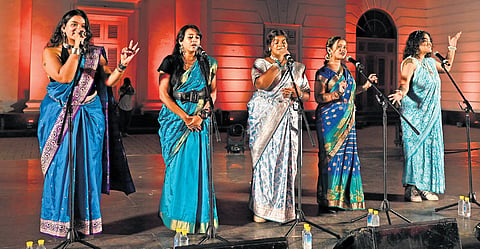

Draped in blue saris and sneakers, five women spit verses that tell powerful tales of womanhood, rebellion, and self-liberation. They are Wild Wild Women—India’s pioneering all-women hip-hop collective. Based in Mumbai, the group has been a fierce presence in Indian hip-hop since late 2020. Recently, they lit up Delhi’s Travancore Palace during ‘Empowerment — Art and Feminism’, a showcase by Kunstmuseum and Goethe-Institut.
The collective is led by five fiery rappers: Ashwini Hiremath (Krantinaari), Preeti Sutar (HashtagPreeti), Shruti Raut (MC Mahila), Jacquilin Lucas (JQueen), and Pratika Prabhune (Pratika). Alongside them are breakdancers FlowRaw (Deepa Singh) and MGK (Mugdha Mangaonkar), skateboarder Shruti Bhosle, and graffiti artist Gauri Dabholkar.
It all began in Marol in 2020 when Krantinaari and HashtagPreeti, frustrated by the lack of women in India’s hip-hop scene, decided to create the space they couldn’t find. “Wild Wild Women was meant to be an open community, but as we started jamming and sharing, it became personal and brought us closer,” says Krantinaari.
Their discography is a fearless critique of patriarchy, tackling everything from PCOS and mental health to gender violence and everyday womanhood. “Music is like breathing for us. It’s how we release anger and emotion,” says JQueen. “When the listener hears it, they feel it too.”
One of the first tracks they performed in Delhi was their cypher ‘Uddu Azad’— a song that speaks of breaking free from societal chains and carving space in a world that often limits women. “In hip hop, there’s this pressure to maintain a tough, hardened exterior,” says Pratika. “‘Uddu Azad’ was the first time we allowed ourselves to feel everything fully. We weren’t trying to be ‘inspiring’ or ‘hard.’”
“The song holds pieces of our personal journeys—how we started, what we faced, and how we grew. We perform it everywhere,” says HashtagPreeti.
Double lives
They have performed across India, from Chennai to Mumbai and Delhi; their first international tour was last March at the Jenseits von Nelken und Pralinen Festival in Germany.
But none of this came easy. Before becoming full-time artists, the women balanced jobs, family expectations, and secret jam sessions. Krantinaari worked a corporate job by day, practising rap by night, telling her family she had “late office work and I was believed as they thought design jobs were like that.”
They found out when she appeared on MTV’s ‘Sound Trippin’, but it wasn’t until she was invited to Denmark’s Roskilde Festival that they truly supported her. JQueen had a similar journey. She worked a 9-to-5 job in real estate and travelled over an hour each evening to jam. “I did what my family wanted, but I did what I loved too,” she recalls.
Performing in sari
One of their signature visuals is rapping in sarees. The idea stemmed from Krantinaari’s childhood memories of sneaking into her grandma’s cupboard, pulling out the most colourful saris. “It was about feeling more feminine and grown-up, wanting to relate to our mothers,” says Krantinaari. Initially, the group was unsure of their look. “We wanted to wear jackets, the usual western fits,” says HashtagPreeti.
But once they hit the stage in saris, something shifted. “Every woman watching us could relate. There’s something powerful about seeing a woman in a sari owning the mic.” For them, the sari isn’t just a symbol of power on stage, but a representation of women across the nation. “It’s more representative of all women in our country,” says Pratika. The sari evolved from a costume to a statement—an armour and identity wrapped in six yards.
Rapping in every tongue
What sets Wild Wild Women apart is their multilingual verses. They rap in Marathi, Hindi, Tamil, Kannada, and English, bringing regional pride to a global genre. “People connect more when I rap in Marathi,” says MC Mahila. “In Marathi, especially in Maharashtra or Mumbai, it’s like, ‘Oh, she’s spitting fire.’ The connection grows when we represent our own language.”
JQueen, a Tamilian, recalls performing in Chennai: “On stage, I couldn’t hear the crowd, thinking they weren’t interested. But in the videos, they were so loud! When I spoke in Tamil, they connected with me differently. I could literally feel the difference.”
Krantinaari reflects on the deeper politics of language: “We’re creating for our people and ourselves. The colonisers have left. Our story is ours. The only way to fight it is to preserve our culture through our own tongues. English connects us globally, but our native languages are just as vital.”
Breaking into the scene
Hip-hop in India has long been a boys’ club but Wild Wild Women has cracked that open. “The industry told us we didn’t have an audience,” says Krantinaari. “That’s why no one signed us or booked us initially. But when five women are on stage, every girl in the audience can connect to at least one of us.” They want the youth to see hip-hop not as a “male-dominated” space, but a free space. “Once you see yourself as equal to a man, it stops being a ‘male-dominated’ space. It becomes yours. You claim it,” says HashtagPreeti.
For the group, breaking barriers on stage goes hand in hand with fighting societal issues. When asked about gender-based violence, like the case in Kolkata, they feel it in their bones. “Our blood boils. We feel helpless. We might write songs, but will that help the victim?” says HashtagPreeti. “How much of a change is it going to get? I think all we can do is educate men around us so that it doesn’t happen in our surroundings, or families. Because there are countless voiceless women facing this every day.”